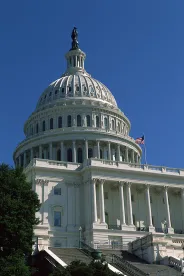We’ve previously blogged about the regulation of CBD by the Food and Drug Administration (FDA), and it appears that the dialogue around CBD isn’t slowing down as we continue through the second half of 2019. Recently, a bipartisan group of Senators introduced the Cannabidiol and Marijuana Research Expansion Act (S. 2032), a bill to encourage scientific and medical research on marijuana and its compounds including cannabidiol, or CBD.
The bill would expedite the process by which researchers can request an increase in the amount of a Schedule I substance used for approved research by sidestepping the FDA when requesting more marijuana for use in their research. The legislation also would streamline development of FDA-approved drugs that use CBD and marijuana by allowing accredited medical and osteopathic schools, practitioners, research institutions and manufacturers with a Schedule I registration to manufacture marijuana for research.
Marijuana and CBD show promise for treating a wide-range of diseases and disorders. However, there is a lack of research evaluating the potential medical benefits because of barriers in the federal law. As a result, many are using marijuana-derived products that are unapproved by FDA to treat serious illnesses. According to Senators Chuck Grassley (R-IA) and Dianne Feinstein (D-CA), the bill’s focus is on expanding research that is necessary to determine the potential medical and health benefits of the substances, particularly for intractable epilepsy. “Many parents have had success treating their children with CBD oil, particularly for intractable epilepsy, but there are still too many unknowns when it comes to the medical use of marijuana and its compounds,” Senator Feinstein said. “Current regulations make medical marijuana research difficult and stifles the development of new treatments. Our combined bill streamlines the research process and paves the way for marijuana-derived medications that are FDA-approved to keep consumers safe.”
Currently, there is only one FDA-approved CBD drug for epilepsy, known as Epidiolex, which is approved for a limited population of epilepsy patients. However, many epilepsy patients use unapproved and therefore unregulated CBD products because of Epidiolex’s limited approval. Because of this, there is little available information about the interactions of marijuana-derived products with other medications, appropriate doses of use, or proper delivery mechanisms. Additionally, insurance does not cover the cost of the drug for patients who fall outside the covered indications.
Under existing law, researchers seeking a greater quantity of a Schedule I drug for approved research must submit a request to the Drug Enforcement Administration (DEA), which DEA reviews and comments on before sending to the FDA for final approval. The proposed bill would streamline this process by allowing researchers to notify just DEA of the increase in the quantity of Schedule I substances for approved research, rather than DEA and FDA.
Additionally, the bill would require DEA to license manufacturers of FDA-approved CBD or marijuana drugs for commercial uses. In other words, DEA would be able to approve applications for manufacturers to cultivate their own cannabis for research purposes. Manufacturers also would be able to import cannabis materials to facilitate research rather than cultivate their own. The bill would not change FDA’s authority with respect to oversight of investigational new drugs (INDs) or drug marketing applications; therefore, even though the bill would make it easier to obtain CBD for research purposes, those seeking to market drugs with CBD would still need to go through the normal regulatory approval process.
In addition to Senators Feinstein and Grassley, the bill has nine bipartisan co-sponsors, including the influential chairman of the Senate Health, Education, Labor, and Pensions (HELP) Committee, Lamar Alexander. While it is always difficult to predict whether legislation will pass, a bipartisan bill co-sponsored by a committee chairman makes this one more likely than others to move. We will keep an eye on it and other Congressional and agency actions related to CBD.




 />i
/>i

